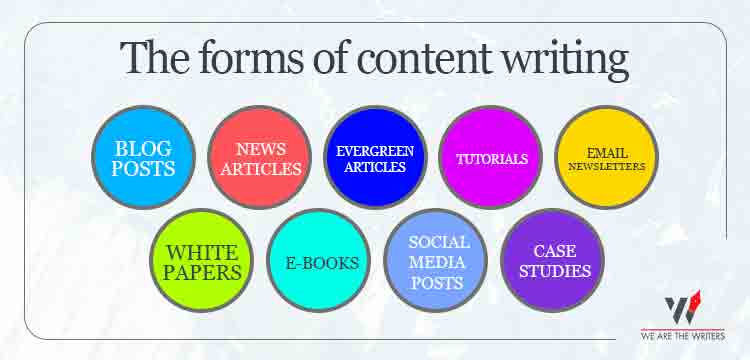The internet has made the world a much more connected place. It has even made work and jobs easier to propagate. One of the best examples is Freelance Writing.
As the name suggests, freelance writing means writing on an independent basis. The scope of freelance writing has become humongous but what is freelance writing’s best bet ? Copywriting or Content writing.
There are many other popular forms of freelance writing but the most talked upon are Copywriting vs Content Writing.
Suggested read:
- TOP 10 TIPS and TRICKS TO BECOME GREAT CONTENT WRITING COMPANY!
- A GUIDE TO SEO CONTENT WRITING
- 8 TIPS FOR HIRING THE PERFECT CONTENT WRITING COMPANY
Table of Contents
Copywriting vs Content Writing
There’s a fine line distinguishing content writing from copywriting.
In digital marketing, content writing is all about educating or entertaining, and copywriting is about persuading.
You’ll typically perform content writing when creating organic website content. Content that is specifically designed as educational. In comparison, you’ll perform copywriting when creating paid ads and other pieces of sponsored written content.
“Another difference between content writing and copywriting is that the latter often invokes an emotional response, while the former does not. According to research conducted by Harvard University professor Gerald Zaltman, over 9 in 10 consumer purchases are driven by emotion” says forbes

Suggested Read : SEO COPYWRITING – A Strong Appeal to Users and Algorithms
What Is Copywriting ?
Copywriting refers to the creation of written content to persuade the readers to take some type of action related to your business’s sales process.
For instance, if you’re trying to sell a product, you’ll need to convince prospective customers that it’s worth making a purchase.
The art of persuading readers to take some type of sales-related action defines what is copywriting. It involves talking about the brand’s products.
Effective advertising starts with influential copy-writing, and this marks the necessity of copywriters in almost every field, irrespective of their base; online or offline. From technical to non-technical, copy-writing varies and so is the need for dynamic writers. Copywriting can also be called a direct sales brochure of the product.
Copywriting is another word for “marketing writing.” It refers to the written content that’s used to market a product in some way. When someone creates the text for an advertisement or other copywriting examples like website, brochure, catalog, direct mail piece, tagline, white paper, social media post, or any other marketing communication entity, they are writing a copy.
“Copy” can refer broadly to text intended to be published on any platform (including news articles), marketers typically use the term to describe any text used to promote a product.
Copywriting is an art of writing a text for the motive of advertising or promotion.

These are some copywriting examples :
• Social media ads.
• Product pages.
• Website sales copy.
• PPC landing pages.
• PPC ads.
• Cost-per-mille (CPM) ads.
• Sales emails.
• Short Message Service (SMS) ads.
What Is Content Writing?
Content writing involves the creation of written content for sharing valuable information and also entertaining the readers. It has the capacity to drive sales as well, but that’s not its primary purpose. With content writing, you can educate or entertain readers by creating high-quality and valuable content.
The forms of content writing include:

• News articles
• Evergreen articles
• Tutorials
• Email newsletters
• White papers
• E-books
• Social media posts
• Case studies
Approach
Content writing has a very informative approach to the customers. It presents the information and data in order to educate and entertain.
Copywriting , on the other hand, has a persuasive approach towards the audience. It presents data in such a manner that aims to drive action from the customer’s end.
Purpose
Before creating a new piece of content for your brand to use for marketing, analyse its purpose. Content writing and copywriting are primarily distinguished from each other by purpose. Content writing is designed to educate or entertain, whereas copywriting is designed to persuade.
Most written ads involve copywriting because they aim to compel readers to take action. Whether on Google, Bing, Facebook or elsewhere on the internet, businesses use text ads to encourage their prospective customers to take action that could be a sale.
Length
Content writing has a rather longer content than copywriting as it aims to educate, inform and entertain. It provides detailed knowledge about the content. It is easier to persuade readers to take action using just one or two sentences, but educating or entertaining them will likely require longer lengths of content. Depending on the topic, you may need to use anywhere from 500 to 2,500 words.
On the other hand short pieces of content can be really moving. Taglines, punchlines and slogans are widely used in copywriting. The vested power of catching attention via hitting lines works wonders for the product or the whole brand.
The Job
Copywriters write copy and content writers write content.
A copywriter is a professional whose job is dedicated to producing copy. This can come in many forms like Social media ads, product pages, website sales copy etc. But the general idea is that a copywriter writes marketing material for a living. It is their trade, craft or skill.
Now, a content writer can be anyone who produces content. Thanks to the democratization of the internet, anyone can write now, including professionals, executives, authors, bloggers, software engineers, CEOs, brands, etc. Of course, the best content writers understand the craft of content writing, but it may not be their trade.
Emotions
You wouldn’t need to be under the influence of any emotion when the content you’re consuming was created using content writing. You get along with its motive to educate and entertain. According to research conducted by Harvard University professor Gerald Zaltman, over 9 in 10 consumer purchases are driven by emotion.
The most common emotion that is displayed while copywriting is the Fear of missing out (FOMO), for example, the copy may compel a consumer to buy a product so that they don’t miss out on its benefits. Classic comparison strategy. With the rise of social media, many consumers now feel compelled to buy and use new products after seeing their friends use them in social media posts.
FOMO is just one of many emotions frequently invoked in copywriting. Others include security, pride, comfort, a sense of belonging and instant gratification.
Grammar
While you should try to minimize grammar errors in all of your content creation activities, it is especially important in content writing. Grammatical errors interrupt readers’ thoughts by forcing them to stop the process of informing and educating.
Whether it’s about missing punctuations at the end of a sentence or a skeptical modifier, readers will likely stop to process the grammar error. It may cause some readers to abandon the content without reading the rest of it.
Copywriting, on the other hand, doesn’t require perfect grammar to be effective. Infact, incorrect grammar can actually work in your favour for catching the interests of the customers. Copywriting has slogans, taglines, punchlines and catchy content that can ignore correct grammar for once if the content is still somehow making sense and is attention grabbing.
Most online advertising portals also have a word limit in the written content. The copywriter has to only use the allowed number of words to communicate the emotions that are intended. To stay within this limit, you may need to condense your text ad by removing unnecessary words or punctuation. Just remember to keep your text ads coherent and easy to read while complying with the advertising portal’s guidelines.
SEO (Search Engine Optimisation)
Whether created by content writing or copywriting, any piece of high-quality content can rank high in the search results if it’s relevant to a search query. For SEO, though, content writing outperforms copywriting by miles. Your website will earn higher search rankings and more search traffic if you perform content writing to develop it.
Content writing is better for SEO than copywriting for several reasons.
First, it offers high value to readers, because it informs and educates.
And second, it doesn’t express commercial intent. Rather, content writing is purely informational, so readers enjoy consuming and sharing it.
Another reason content writing is better for SEO is because of its longer length. Long-form content generally ranks for more keywords than short-form content. It attracts more views, which usually leads to more backlinks. All and all, the more words and quantity of data that goes into SEO, the better ranking is expected.
The Mindset
One of the core differences between these two types of writings is their mindset around content creation.
When you talk about what is Copywriting , you have to talk about sales. To be a compelling copywriter, you need to have a positive belief system around sales. You shall create the content in such a manner that it sells. You don’t need to completely inculcate your perspective into the writeup and work according to the aspects that drive sales.
If you are someone who likes to present knowledge in a manner that has a larger value to it and has more chances of adding value to the readers’ lives, you are better set to become a content writer.
Conclusion
The foremost as well as the ultimate key to distinguish what is copywriting from that of content writing is to identify the intent of the created content.
Content writing usually informs and educates the reader. Whereas copywriting not only informs the reader, but takes it a step further by being persuasive and compelling the reader to act as well.
Once you understand what copywriting is, you’ll start to notice it everywhere. You’ll realize that a copy influences your own purchase decisions all the time. There are times when you don’t even know that you have been persuaded into buying something via a copy. This is also one of the most common ways of advertising and promotions.
Like content, effective copywriting also uses research to educate the audience. So when you’re first starting out, it’s tough to differentiate these two types of writing from one another.
Both are incredibly important. Content creates brand loyalty and engagement. Copy creates sales. The more brand loyalty a business has, the easier it is to sell their products and services.
So, to think of, content writing and copywriting go hand-in-hand in the realms of a brand’s marketing strategy and freelance writing options.





 WhatsApp
WhatsApp